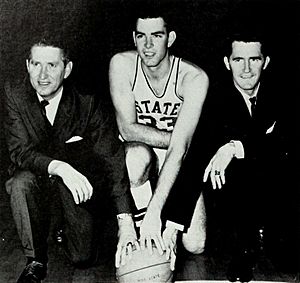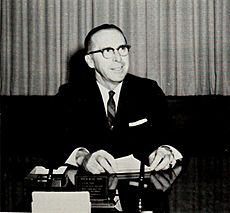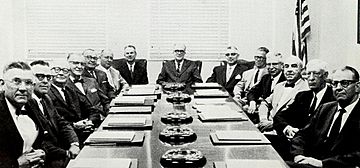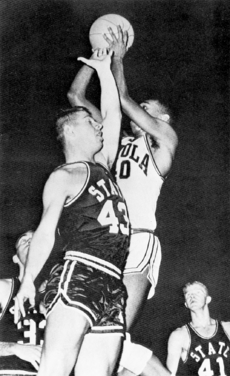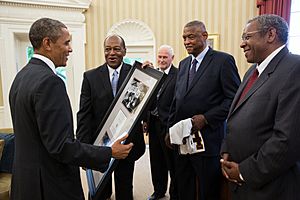Game of Change facts for kids
The Game of Change was a famous college basketball game. It was played between the Loyola Ramblers and the Mississippi State Bulldogs. The game happened on March 15, 1963, during the 1963 NCAA University Division basketball tournament. It took place at Jenison Fieldhouse in East Lansing, Michigan.
This game was very important during the American civil rights movement. Loyola's team had black and white players. Mississippi State's team was all white. This game is remembered as a big step in ending racial separation in college basketball.
Back then, teams usually played with only one or two black players. But Loyola's team had four black players starting. They faced mean letters and insults from people who supported segregation. Still, Loyola had a great season, winning 24 games and losing only 2.
Mississippi State had won their league title four times in five years. But they had never played in the NCAA tournament before. This was because of an unwritten rule. Mississippi teams were not allowed to play against teams with black players.
When the university president, Dean W. Colvard, said the team would go to the tournament, some state officials tried to stop them. The Bulldogs used a clever plan with some players acting as decoys. They avoided being stopped and flew to Michigan the day before the game.
Loyola had easily won their first tournament game. They beat Tennessee Tech by a huge 69 points. Mississippi State had a first-round break. Before the game, Jerry Harkness, a black player from Loyola, shook hands with Joe Dan Gold, a white player from Mississippi State. Loyola won the game 61–51. They went on to win the entire NCAA tournament. They beat Cincinnati in the championship game.
Contents
How the Teams Got There
Loyola-Chicago: Breaking Barriers
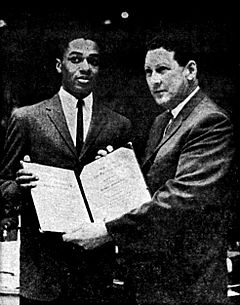
In the early 1960s, there was an unspoken rule in college basketball. Teams were expected to play only two or three black players at a time. For many years, Loyola's coach, George Ireland, followed this rule.
In the 1961–62 season, Loyola's starting team had three black players. These were Jerry Harkness, Vic Rouse, and Les Hunter. They also had two white players. But coach Ireland wanted to win more.
After losing a big game, Ireland decided to change things. He started five players, including four black players. This was the first time he broke the unwritten rule. This new lineup worked very well. Ireland used the same five players for the entire 1962–63 season.
Coach Ireland said other coaches didn't like his choice. He even joked that they said he was "recruiting in Africa." Loyola players often faced unfair treatment when they traveled. Once, they had to find separate places to stay because of their mixed team. At another game, fans yelled insults and threw things.
Despite these problems, the Ramblers played great basketball. They finished the regular season with 24 wins and only 2 losses. They were ranked among the top teams in the country. Loyola easily won their first tournament game. They beat Tennessee Tech 111–42. This was the biggest win in tournament history at that time. This win set them up to play Mississippi State.
Mississippi State: Facing Old Rules
In the late 1950s and early 1960s, coach Babe McCarthy led the Mississippi State Bulldogs to great success. They won their league title four times in five years. The 1962–63 season was another strong year. They won their league title again.
However, Mississippi State's team was all white. They only played against other all-white teams. They stayed in the South for all their games. They had turned down invitations to the NCAA tournament before. This was to avoid playing against teams with black players. There was an "unwritten law" in Mississippi. It said no team from the state should play against black players.
But the civil rights movement was growing stronger. People started to question this rule. On February 26, 1963, students at Mississippi State voted to accept the tournament invitation. They even gathered 2,000 signatures to support this idea.
The final decision was up to Dean W. Colvard, the university president. He received many calls and letters. Most people wanted the team to play. On March 2, 1963, Colvard announced he would send the team. He said he would do so "unless hindered by competent authority."
Colvard's decision caused a big debate in Mississippi. Some state lawmakers disagreed. They worried it would lead to more changes, like what happened when James Meredith became the first black student at the University of Mississippi. But other lawmakers supported Colvard. The players themselves also wanted to play. A local poll showed 85% of people approved of the decision.
On March 5, the state college board met to discuss Colvard's decision. The board voted 8–3 to support sending the team to the tournament. They also voted to show confidence in Colvard's leadership.
However, some people, including the governor, still opposed it. On March 13, two state senators got a court order. This order tried to stop the team from playing. The team's coach, Babe McCarthy, left the state early to avoid being served the order.
The next morning, the team used a clever trick. They sent five reserve players to the airport as decoys. If these players were stopped, the main team would take a private plane. The deputy sheriff who was supposed to serve the order didn't stop them. Some say he arrived too late. The team then flew to Michigan without any problems. Later that day, a higher court canceled the order.
The Game of Change: On the Court
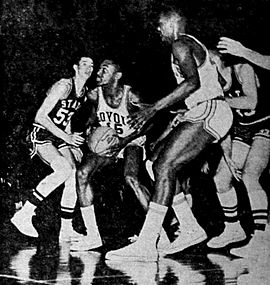
On game night, Jenison Fieldhouse was full. About 12,143 fans were there. The Loyola–Mississippi State game was the second game of the night.
Before the game, Jerry Harkness, a black player from Loyola, shook hands with Joe Dan Gold, a white player from Mississippi State. Harkness later said that when the cameras flashed, he knew "this was more than just a game. This was history being made."
Even with all the tension, the game itself was played fairly. Mississippi State started strong, leading 7–0. But Loyola quickly caught up. Jerry Harkness scored some key points to tie the game. By halftime, Loyola was ahead 26–19.
In the second half, Loyola's Vic Rouse and Les Hunter played very well. They helped Loyola stretch their lead to 39–29. Mississippi State fought back, getting within three points. But then, their top scorer, Leland Mitchell, had to leave the game because of fouls. Loyola's lead grew to 57–42. The Bulldogs couldn't catch up. Loyola won the game 61–51.
After the game, Loyola's coach, George Ireland, praised Mississippi State. He said they had a very tough defense. Mississippi State's coach, Babe McCarthy, said Loyola won because they were better at getting rebounds. He felt his team would have needed a "near perfect game" to win.
Game Statistics
|
Friday, March 15
9:30 p.m. EDT |
| Mississippi State 51, Loyola-Chicago 61 | |||
| Scoring by half: 19–26, 32–35 | |||
| Pts: L. Mitchell – 14 Rebs: L. Mitchell – 11 |
Pts: J. Harkness – 20 Rebs: V. Rouse – 19 |
||
|
Jenison Fieldhouse – East Lansing, Michigan
Attendance: 12,143 Referees: Philip Fox, John Stevens |
| Legend | |||||
|---|---|---|---|---|---|
| No. | Jersey number | Pos | Position | FGM | Field goals made |
| FGA | Field goals attempted | FTM | Free throws made | FTA | Free throws attempted |
| Reb | Rebounds | PF | Personal fouls | Pts | Points |
| No. | Player | Pos | FGM | FGA | FTM | FTA | Reb | PF | Pts | ||||||||
|---|---|---|---|---|---|---|---|---|---|---|---|---|---|---|---|---|---|
| 44 | Leland Mitchell | F | 6 | 10 | 2 | 5 | 11 | 5 | 14 | ||||||||
| 33 | Joe Dan Gold | F | 3 | 9 | 5 | 7 | 3 | 3 | 11 | ||||||||
| 42 | Doug Hutton | G | 5 | 9 | 0 | 2 | 1 | 0 | 10 | ||||||||
| 53 | Stan Brinker | G | 3 | 6 | 3 | 5 | 7 | 4 | 9 | ||||||||
| 41 | Red Stroud | G | 3 | 15 | 1 | 1 | 3 | 2 | 7 | ||||||||
| 43 | Aubrey Nichols | G | 0 | 0 | 0 | 0 | 0 | 0 | 0 | ||||||||
| Team totals | 20 | 49 | 11 | 20 | 25 | 14 | 51 | ||||||||||
| Statistics from Sports-Reference.com, rosters from game program | |||||||||||||||||
| No. | Player | Pos | FGM | FGA | FTM | FTA | Reb | PF | Pts | ||||||||
|---|---|---|---|---|---|---|---|---|---|---|---|---|---|---|---|---|---|
| 15 | Jerry Harkness | F | 7 | 11 | 6 | 7 | 9 | 1 | 20 | ||||||||
| 40 | Vic Rouse | F | 8 | 24 | 0 | 0 | 19 | 4 | 16 | ||||||||
| 41 | Les Hunter | C | 3 | 13 | 6 | 7 | 10 | 3 | 12 | ||||||||
| 42 | Ron Miller | G | 5 | 9 | 1 | 1 | 4 | 1 | 11 | ||||||||
| 11 | John Egan | G | 1 | 9 | 0 | 1 | 1 | 5 | 2 | ||||||||
| 23 | Chuck Wood | G/F | 0 | 0 | 0 | 0 | 1 | 3 | 0 | ||||||||
| Team totals | 24 | 66 | 13 | 16 | 44 | 17 | 61 | ||||||||||
| Statistics from Sports-Reference.com, rosters from game program | |||||||||||||||||
What Happened Next
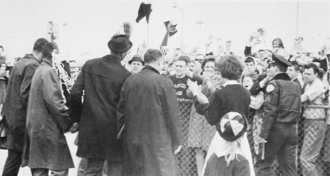
After beating Mississippi State, Loyola easily moved forward. They defeated Illinois 79–64 in the next round. Then, they beat Duke 94–75 in the national semifinal.
In the championship game, the Ramblers played against Cincinnati. The game went into overtime. Loyola finally won 60–58. This was Loyola-Chicago's first national championship. It is still the only one for the state of Illinois.
The day after the Loyola game, Mississippi State played a consolation game. They won 65–60 against Bowling Green. They returned home as the third-place team from their region. About 700 fans greeted them at the airport. In 1965, Mississippi State University became an integrated campus. Richard E. Holmes was the first black student to enroll there.
The Game's Lasting Impact
The 50th anniversary of the Game of Change was celebrated with many events. On December 15, 2012, Mississippi State visited Loyola for the first time since 1963. Players from both historic teams were there. Loyola won the game 59–51.
In July 2013, members of the 1962–63 Loyola team visited Washington, D.C.. They toured the Capitol Building. They also met with President Barack Obama in the Oval Office. In November 2013, the 1962–63 Loyola team was honored. They were put into the National Collegiate Basketball Hall of Fame. This was the first time an entire team was inducted.
People still discuss how important the Game of Change was for the civil rights movement. The 1962–63 Loyola Ramblers are sometimes not as well-known as the 1965–66 Texas Western Miners. The Miners won the 1966 NCAA championship with an all-black starting team. They beat an all-white Kentucky team.
Some argue that the Game of Change didn't cause big changes right away. They point to problems that continued in Mississippi after the game. However, others say the game was still very important. It showed that white athletes and students were against the old rules about race in sports. The national attention Loyola's championship brought was a "big deal" in 1963.


